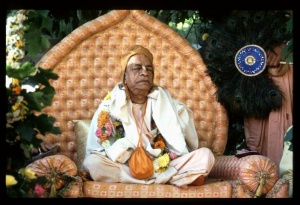CC Antya 19.40: Difference between revisions
m (1 revision(s)) |
No edit summary |
||
| Line 1: | Line 1: | ||
{{ | [[Category:Sri Caitanya-caritamrta - Antya-lila Chapter 19|C040]] | ||
<div style="float:left">'''[[Sri Caitanya-caritamrta|Śrī Caitanya-caritāmṛta]] - [[CC Antya|Antya-līlā]] - [[CC Antya 19|Chapter 19: The Inconceivable Behavior of Lord Śrī Caitanya Mahāprabhu]]'''</div> | |||
<div style="float:right">[[File:Go-previous.png|link=CC Antya 19.39|Antya-līlā 19.39]] '''[[CC Antya 19.39|Antya-līlā 19.39]] - [[CC Antya 19.41|Antya-līlā 19.41]]''' [[File:Go-next.png|link=CC Antya 19.41|Antya-līlā 19.41]]</div> | |||
{{CompareVersions|CC|Antya 19.40|CC 1975|CC 1996}} | |||
{{RandomImage}} | |||
==== TEXT 40 ==== | ==== TEXT 40 ==== | ||
<div | <div class="verse"> | ||
eka-bāra yāra nayane lāge, sadā tāra hṛdaye jāge, | :eka-bāra yāra nayane lāge, sadā tāra hṛdaye jāge, | ||
kṛṣṇa-tanu—yena āmra-āṭhā | :kṛṣṇa-tanu—yena āmra-āṭhā | ||
nārī-mane paiśe hāya, yatne nāhi bāhirāya, | :nārī-mane paiśe hāya, yatne nāhi bāhirāya, | ||
tanu nahe,—seyā-kulera kāṅṭā | :tanu nahe,—seyā-kulera kāṅṭā | ||
</div> | </div> | ||
| Line 14: | Line 18: | ||
==== SYNONYMS ==== | ==== SYNONYMS ==== | ||
<div | <div class="synonyms"> | ||
eka- | ''eka-bāra''—once; ''yāra''—whose; ''nayane''—eyes; ''lāge''—capture; ''sadā''—always; ''tāra''—his; ''hṛdaye''—in the heart; ''jāge''—remains prominent; ''kṛṣṇa-tanu''—the body of Kṛṣṇa; ''yena''—like; ''āmra''-āṭhā—the sap of the mango tree; ''nārī''-mane—in the minds of women; ''paiśe''—enters; ''hāya''—alas; ''yatne''—even with great endeavor; ''nāhi''—does not; ''bāhirāya''—come out; ''tanu nahe''—is not an ordinary body; ''seyā-kulera kāṅṭā''—it is like the thorn of the seyā berry tree. | ||
</div> | </div> | ||
| Line 21: | Line 25: | ||
==== TRANSLATION ==== | ==== TRANSLATION ==== | ||
<div | <div class="translation"> | ||
"If a person’s eyes even once capture that beautiful body of Kṛṣṇa, it remains always prominent within his heart. Kṛṣṇa’s body resembles the sap of the mango tree, for when it enters the minds of women, it will not come out, despite great endeavor. Thus Kṛṣṇa’s extraordinary body is like a thorn of the seyā berry tree. | |||
</div> | </div> | ||
__NOTOC__ | |||
<div style="float:right; clear:both;">[[File:Go-previous.png|link=CC Antya 19.39|Antya-līlā 19.39]] '''[[CC Antya 19.39|Antya-līlā 19.39]] - [[CC Antya 19.41|Antya-līlā 19.41]]''' [[File:Go-next.png|link=CC Antya 19.41|Antya-līlā 19.41]]</div> | |||
__NOTOC__ | |||
__NOEDITSECTION__ | |||
Revision as of 07:15, 19 October 2021

A.C. Bhaktivedanta Swami Prabhupada
TEXT 40
- eka-bāra yāra nayane lāge, sadā tāra hṛdaye jāge,
- kṛṣṇa-tanu—yena āmra-āṭhā
- nārī-mane paiśe hāya, yatne nāhi bāhirāya,
- tanu nahe,—seyā-kulera kāṅṭā
SYNONYMS
eka-bāra—once; yāra—whose; nayane—eyes; lāge—capture; sadā—always; tāra—his; hṛdaye—in the heart; jāge—remains prominent; kṛṣṇa-tanu—the body of Kṛṣṇa; yena—like; āmra-āṭhā—the sap of the mango tree; nārī-mane—in the minds of women; paiśe—enters; hāya—alas; yatne—even with great endeavor; nāhi—does not; bāhirāya—come out; tanu nahe—is not an ordinary body; seyā-kulera kāṅṭā—it is like the thorn of the seyā berry tree.
TRANSLATION
"If a person’s eyes even once capture that beautiful body of Kṛṣṇa, it remains always prominent within his heart. Kṛṣṇa’s body resembles the sap of the mango tree, for when it enters the minds of women, it will not come out, despite great endeavor. Thus Kṛṣṇa’s extraordinary body is like a thorn of the seyā berry tree.